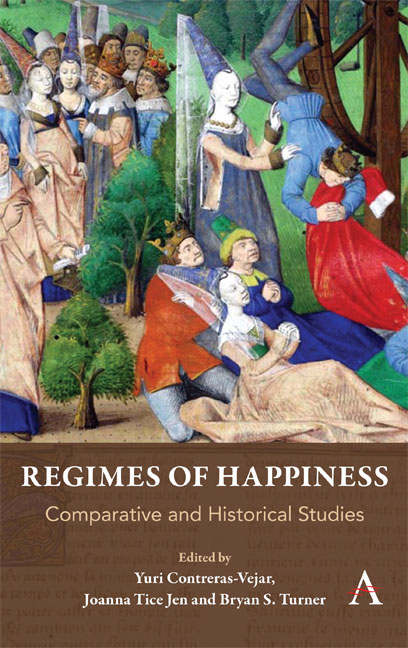Book contents
- Frontmatter
- Contents
- Acknowledgements
- Notes on Contributors
- Introduction: Reflections on Regimes of Happiness
- Part I Happiness in the West
- Part II Comparative Perspectives
- Chapter Ten And You Should Be Nothing but Happy: Judaism and the Dual Approach to Joy
- Chapter Eleven Happiness in Medieval Islamicate Literature: Conceptual and Practical Problems
- Chapter Twelve From Liberation to Happiness: The Making of Modern, Middle-Class Yoga
- Chapter Thirteen The Pursuit of Happiness in Vietnam
- Chapter Fourteen Indigenous and Western Views of Happiness: An Essay on the Politics of Contentment
- Chapter Fifteen A Nineteenth-Century Turning Point: Nietzsche, Weber, Freud and Mill
- Index
Chapter Thirteen - The Pursuit of Happiness in Vietnam
from Part II - Comparative Perspectives
Published online by Cambridge University Press: 29 May 2019
- Frontmatter
- Contents
- Acknowledgements
- Notes on Contributors
- Introduction: Reflections on Regimes of Happiness
- Part I Happiness in the West
- Part II Comparative Perspectives
- Chapter Ten And You Should Be Nothing but Happy: Judaism and the Dual Approach to Joy
- Chapter Eleven Happiness in Medieval Islamicate Literature: Conceptual and Practical Problems
- Chapter Twelve From Liberation to Happiness: The Making of Modern, Middle-Class Yoga
- Chapter Thirteen The Pursuit of Happiness in Vietnam
- Chapter Fourteen Indigenous and Western Views of Happiness: An Essay on the Politics of Contentment
- Chapter Fifteen A Nineteenth-Century Turning Point: Nietzsche, Weber, Freud and Mill
- Index
Summary
On a hot October day in 1987 one of the authors (Salemink) had the rare opportunity, as a Vietnamese language student at what was then Hanoi University, to join a group of Australian diplomats on a trip to Chùa Hương, the famous Perfume Pagoda in Mỹ Đức district, some 50 km from Hanoi city. In 1987 Vietnam had just embarked on the road to economic reforms known as Đổi Mới (Renovation), but had barely started to open up, as having contact with foreigners was suspect, and most religious activity was banned as superstitious and/ or counterrevolutionary. In this context, any trip out of the city was a rare treat. The trip to Chùa Hương brought the group in a bus to Bến Đục village, where we boarded small boats rowed by young women to follow the Yến stream through fairytale landscape to the foot of the limestone mountain range known as Hương Sơn. Near the landing place was a renovated wooden temple, from where a steep, narrow and ill- maintained path led up the mountain to the Hương Tích cave. There were only few other visitors, and the mountain path was mostly used by local farmers transporting forest produce and by goats. The spacious cave at the end of the path housed statues of the Buddha and Quan Âm, the female bodhisattva better known by the Chinese name Guanyin, and was filled with the smoke of incense. The incense sticks were lit by women who came there as pilgrims, to venerate Quan Âm, even though it was not the time of the Chùa Hương festival, which begins in the week after Vietnamese New Year. When asked about their reasons for the pilgrimage, they answered that they came to pray for hạnh phúc, usually translated as happiness. One of the women patiently explained to Salemink— a novice student of Vietnamese at the time— that hạnh phúc denoted having children; in other words, the women had come to pray to Quan Âm, requesting the deity to gift them a child [cầu con or cầu tự].
In spite of the suppression of things religious at the time, they spent considerable efforts and resources to come to Chùa Hương to make their dream of having offspring come true; without that, they could not become truly happy.
- Type
- Chapter
- Information
- Regimes of HappinessComparative and Historical Studies, pp. 201 - 218Publisher: Anthem PressPrint publication year: 2019



